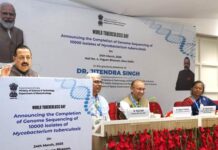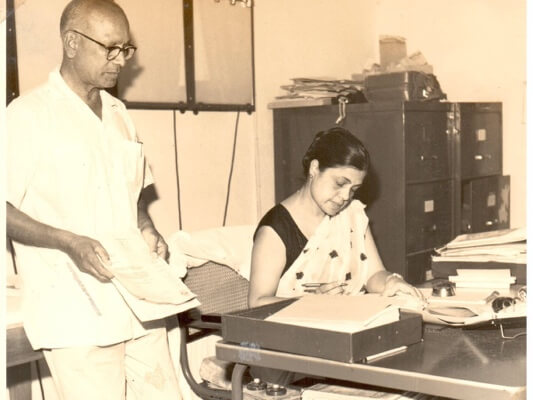Sivaramakrishna Iyer Padmavati, affectionately known as S I Padmavati, was a pioneering cardiologist whose commitment to advancing medical science and serving the underprivileged secured her a prominent place in India’s medical history. Born on June 20, 1917, in Rangoon, Burma (now Myanmar), into a Tamil Brahmin family, she transcended societal expectations to become India’s first female cardiologist. Her remarkable career spanned over seven decades, during which she made significant contributions to cardiology and paved the way for many others to follow in her footsteps. Padmavati’s life epitomized defiance, resilience, and an unwavering commitment to service.
Early Life and Education
Padmavati was born to a barrister father who relocated to Rangoon for work. Growing up in a middle-class family, she faced traditional expectations for women in terms of education and career ambitions. However, her family supported her educational aspirations, allowing her to pursue her dreams with determination.
While most women were confined to domestic roles, Padmavati earned her MBBS degree from Rangoon Medical College. The 1940s were tumultuous for her family due to World War II. When Japan invaded Burma in 1942, she and her family fled to Coimbatore, Tamil Nadu, leaving everything behind. Despite the challenges of displacement, Padmavati’s indomitable spirit helped her navigate these difficult times.
Journey to Excellence in Medicine
After the war, Padmavati’s pursuit of excellence in medicine led her to the United Kingdom. In 1949, she achieved the prestigious FRCP (Fellow of the Royal College of Physicians) from the Royal College of Physicians in London—a remarkable accomplishment for any Indian doctor, especially a woman at the time. She didn’t stop there; Padmavati sought further training from some of the era’s leading medical minds.
Selected to study at Johns Hopkins University in the United States, she trained under the legendary cardiologist Dr. Helen Taussig. Her time at Johns Hopkins proved transformative, honing her skills in cardiology. Soon after, she moved to Harvard University to study under Dr. Paul Dudley White, a founding figure in modern cardiology. By the end of her training in the United States, Padmavati had reached the pinnacle of her medical prowess, with numerous prestigious career opportunities ahead of her. However, she made a defining choice: to return to India to serve her fellow citizens.
Pioneering Cardiology in India
In 1953, Padmavati returned to India and joined Lady Hardinge Medical College in Delhi, where she established the country’s first cardiology clinic. Her expertise quickly earned her a reputation as an exceptional physician, making her an inspiration for many young doctors, particularly women. It was in India that Padmavati truly made her mark by establishing the first cardiac catheterization lab and introducing modern cardiac care to the nation.
In 1962, she founded the All India Heart Foundation (AIHF) to provide quality cardiac care to the underprivileged. Her vision for the foundation centered on patient treatment and preventive cardiology, aiming to make heart health a national priority. This collaboration with the World Health Organization (WHO) trained a generation of students in cardiology, setting India on the path to becoming self-reliant in heart care.
In 1967, she joined Maulana Azad Medical College (MAMC) as a professor of cardiology. Her reputation had spread widely, and she received the Padma Bhushan that same year, one of India’s highest civilian honors. During her tenure at MAMC, she simultaneously served as the chief administrator for three prestigious institutions—Maulana Azad Medical College, Lok Nayak Hospital, and G. B. Pant Hospital—overseeing their medical and academic programs with unmatched dedication.
Padmavati’s contributions to medical education were equally significant. She initiated India’s first Doctor of Medicine (DM) program in cardiology, ensuring future generations of Indian doctors were equipped with the knowledge and skills to excel in the field. Her commitment to teaching, mentoring, and building medical infrastructure was as strong as her dedication to patient care.
Establishing the National Heart Institute
After retiring in 1978 as the director of Maulana Azad Medical College, Padmavati embarked on another ambitious project. In 1981, she founded the National Heart Institute (NHI) in Delhi under the auspices of the All India Heart Foundation. The institute became a leading center for cardiac care, combining patient treatment with research and outreach programs aimed at preventing heart disease. Even in her later years, Padmavati worked tirelessly at the NHI, often putting in 12-hour days well into her 90s.
Honors and Legacy
Throughout her life, Padmavati received numerous accolades. In 1992, she was awarded the Padma Vibhushan, India’s second-highest civilian honor, for her monumental contributions to cardiology and medical education. As reported by thecommunemag, she became the first Indian woman to be a fellow of the European Society of Cardiology in 2007, a rare honor she received at the age of 90, solidifying her status as a global pioneer.
Despite her numerous accomplishments, Padmavati remained deeply committed to serving the underprivileged. She and her sister Janaki, a neurologist, founded the Janaki-Padmavathi Trust, through which they donated their entire earnings to fund life-saving heart surgeries for economically disadvantaged patients. This selflessness characterized her career, during which she consistently prioritized her patients’ welfare over personal gain.
Padmavati continued to work until she was 95, retiring only in 2015. Even after retirement, she remained a guiding light for the medical community, advocating for improved healthcare for all
Passing and Enduring Influence
On August 29, 2020, Padmavati passed away at the age of 103 after contracting COVID-19. Her death marked the end of a remarkable era in Indian cardiology, but her legacy continues to inspire countless doctors and healthcare professionals in India and beyond.
Sivaramakrishna Iyer Padmavati was more than just a pioneering cardiologist; she was a beacon of hope and an embodiment of selfless dedication. Her extraordinary achievements in the face of adversity, contributions to Indian healthcare, and tireless service to the underprivileged make her one of the most inspiring figures in Indian history. She shattered glass ceilings, set new standards in cardiac care, and devoted her life to improving the health of her fellow Indians, leaving a legacy that will endure for generations.























